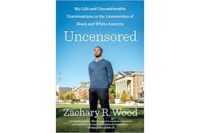
Uncensored
I belong to the Next Big Idea Club. It was created by Malcolm Gladwell, Adam Grant, Susan Cain, and Daniel Pink to promote the ideas of the next generation of thinkers whose insights might change the world. For a fee that is roughly the equivalent of the cover price, they send me eight books a year that they think will change lives AND send a copy to a teenager in an underserved community. So far, they haven’t disappointed.
One of this fall’s two books is Zachary Wood’s Uncensored, which is must reading on two levels, the second of which I want to focus on here.
First, the book is a remarkable memoir by a remarkable 22 year old who overcame a conflict-ridden childhood to achieve national prominence even before he graduated from Williams. It’s a fascinating story of race and success in the U.S. that explores how Wood got beyond his dysfunctional home, ended up at elite private schools, and became the kind of student this former professor, at least, would have died to have in his classroom.
Second, the book charts an approach to dealing with conflict on campuses that Wood developed while at Williams that hit home to me as a conflict resolution professional who has to start teaching a course on conflict in the world today this week. That class will, I’m sure, include students who disagree with me who also think that President Trump is doing a great job and that professors like me enforce political correctness in the classroom. Of course, they may be right.
At Williams, Wood was active in the Uncomfortable Learning student group which went out of its way to invite speakers to campus who were at odds with the predominantly left of center viewpoints of the typical student or faculty member. Wood is careful not to trumpet this as an effort to support freedom of speech as demanded by critics of so-called political correctness. Rather, he wanted to foster what he calls freedom in inquiry in which you invite people you disagree with in order to take on their views and learn about your disagreements together. As he puts it:
Over the last few years, I’ve learned that common ground is more likely to be found when I approach people in good faith and do my best to give them the benefit of the doubt. (248)
Although he doesn’t do much with this in the book, he has videos on the Next Big Idea Club site that explores how he goes about doing that. Since that material is currently behind a fire wall, let me summarize a few key points here:
- Identify crucial issues you both care about
- Explore why you hold to your view so passionately before you enter the discussion
- Ask personal questions so that you find out as much as you can about why your interlocuter holds strong beliefs that are so different from your own
- Listen carefully and make certain that s/he knows that you have accurately heard their argument
- Gently but firmly support your point of view
- When you’re done, thank the person for his/her time AND ask him for recommendations for other things you can read to learn more
None of this is guaranteed to work, but these are the kinds of suggestions that tend to lead to what the late Daniel Yankelovich referred to as dialogues or discussions that are so charged that they leave neither party unchanged.
As I get ready to go into a charged classroom this week, I’ll be keeping Wood’s words in mind. I suggest that you do the same in part by reading the book and seeing his remarkable story.
